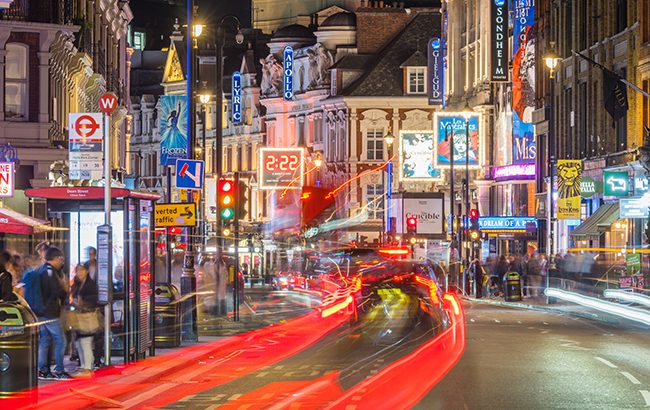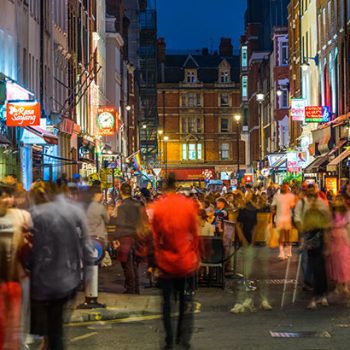London to introduce ‘quiet zones’ in nightlife plan
Westminster City Council has launched its first ‘After Dark’ strategy to improve London’s nightlife through safety measures, improved transport, and dedicated zones for late-night businesses.

The city of Westminster is home to many of London’s most famous attractions, including the West End, and is considered to be the centre of the capital.
New policies include enhanced safety measures such as expanded CCTV, improved lighting, and greater protections for women and vulnerable individuals.
The strategy also addresses accessibility and aims to support family-friendly and non-alcoholic activities through extended retail hours, night-time museum openings, creative workspaces, and community-led offers.
There will also increased support for LGBTQ+ venues.
Venues will also be encouraged to champion sensory-friendly and inclusive entertainment, such as ‘quiet nights’ with reduced noise levels, dimmed lighting, and designated calm zones.
The council also hopes to lobby Transport for London to restore night-bus services and expand safe, reliable transport options after dark.
The council has also suggested that all new licensed venues will be required to assess and mitigate risks to women’s safety, with a zero-tolerance approach to harassment and predatory behaviour.
The UK introduced new legislation that places liability on hospitality venues to prevent sexual harassment last year.
The introduction of ‘quiet zones’
The creation of dedicated ‘late-night entertainment zones’ is intended to encourage new live music and entertainment venues to set up away from residential areas.
Areas specifically outlined as targets for these zones include Oxford Street, The Strand, and Victoria Street. The report said: “These zones will be designed to enhance Westminster’s cultural and economic vibrancy, supporting business growth while reinforcing the city’s global reputation for diverse and dynamic night-time experiences.
“In developing these areas, we will ensure that only responsible late-night operators – those who respect residents, visitors, and local businesses – are permitted to operate, maintaining a balanced and sustainable night-time economy.”

Possible targets for ‘quiet zones’ have not been outlined, nor has it been explained how this will be policed, however the report mentions ‘the quieter communities of Pimlico and Queen’s Park’ in contrast to the ‘bustling streets of Soho’.
The strategy describes the night-time economy of Westminster as having four phases, with the period from 9pm to midnight described as ‘the peak period for hospitality and
entertainment’.
Between midnight and 3am, the report says: “Residential areas quieten down, while central venues close and essential services like cleaning and transport take precedence.”
The strategy features insights from the public and business owners, with some residents expressing “concerns about safety, noise, and the impact of night-time activities on their quality of life”.
The report added: “A proportion of residents, particularly those in central Westminster, wanted stricter regulation of late-night venues to balance vibrant nightlife with residential peace.”
Conversely, business owners sought greater regulatory flexibility, including extended or variable operating hours, and streamlined planning and licensing processes and decision-making.
The draft strategy is now open for public consultation until 22 June.
Balancing the needs of residents and nightlife
Councillor Geoff Barraclough said: “Westminster After Dark aims to balance the needs of a thriving evening and night-time offer with the wellbeing of the residents who call Westminster their home.
“This new strategy is our response to the obvious challenges of managing these competing demands. Following extensive engagement, Westminster After Dark explores how we will remain a welcoming, innovative, inclusive, and liveable city with something on offer for everyone.
“I know that many people feel passionately about this subject. Please get involved and respond to the consultation.”
Last year we looked at what can be done to save London’s nightlife, with the Night Time Industries Association’s Michael Kill pointing to transport issues, safety and inflexible licensing and planning as detrimental to the sector.
Councillor Aicha Less added: “Westminster has long been a global hub of activity and culture, drawing visitors from around the world with its unique mix of history, entertainment, and innovation.
“As the city continues to attract visitors and businesses to its vibrant evening and night-time scene, we are prioritising a safer night-time environment. We will help residents and visitors feel more secure with our measures tackling anti-social behaviour and improving women’s safety, which will boost economic opportunities for night-time venues.
“We want the strategy to enhance the city between 6pm and 6am as a welcoming, thriving, and resilient place for everyone.”
Related news
Scottish on-trade nets 40% business rates relief
Are Indian investors waking up to the power of the on-trade?
